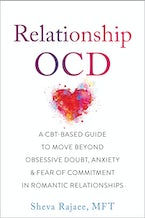By Sheva Rajaee, MFT, author of Relationship OCD
Hear me out—I know this idea may seem shocking if not downright offensive to your romantic sensibilities, but I’m here to say there is absolutely a time to settle when it comes to finding love and lasting commitment. As a psychotherapist specializing in the treatment of anxiety disorders and obsessive-compulsive disorder (OCD) for over a decade, and author of the recent book, Relationship OCD, I have seen firsthand just how a cultural obsession with finding “the One” has done the exact opposite of what we had hoped. Rather than helping us refine our choices and find everlasting happiness, our preoccupation with perfect love in relationships has made us less fulfilled, less connected, and more likely to divorce. As it turns out, settling from an unachievable or unrealistic standard of perfection may be exactly the right thing to do, no matter how cringy this thought may be.
You see, romantic love was not always the cultural obsession it is today. In fact, for most of human civilization, marriage and partnership was an economic choice embarked upon to secure wealth and stability. Romantic love as we know it today was a fantasy or enjoyable daydream rather than the standard people actually expected from their relationships. If you happened to be crazy about your partner, well then that was a plus, but making a smart social match and having lots of children to help till the family land was for centuries the primary goal of love and partnership.
Sometime during the industrial revolution in second half of the 1800’s, everything began to shift, and the lives of the average person shifted along with it. Our choices transformed from collectivistic interests (what is good for the entire family) to individualistic interests (what is good for the person), and as we began moving away from farms and villages to the big city, we began to rely on one person to fill the void. As the renown couples therapist Esther Perel said in her 2013 TED talk: “We basically are asking [our partners] to give us what once an entire village used to provide: Give me belonging, give me identity, give me continuity, but give me transcendence and mystery and awe all in one. Give me comfort, give me edge. Give me novelty, give me familiarity. Give me predictability, give me surprise. And we think it’s a given, and toys and lingerie are going to save us with that.”
Of course, this seismic shift had and has many benefits, and it’s clear that for many, the choice of whom to marry and when to marry must have been an incredible relief and an escape hatch from a life of toil and lovelessness. And yet, somewhere along the way we overcorrected our expectations to the extreme, to a place where the idea of a partner or partnership who does not provide the transcendent experience of fireworks is seen as more than just a bad choice—it is seen as a complete moral failing. Regardless of how compatible a partnership may be or how slow the flame grew, if it did not start out with the “you’ll know it when you feel it” experience we’ve come to call true love, then you have settled and ought to have mustered the characterological fortitude to have expected better for your life. You should have waited to find “the One.”
Which brings me back to my support of settling. You see, it’s not that I am against love—quite the opposite! My hope and the goal of so much of my therapeutic work is to save love from the grip of perfection. To help my clients readjust their expectations so that they may see and appreciate their partners and partnerships for what they are, not what they ought to be according to an unattainable and misguided standard of media perfection. So, when I ask my clients to settle, what I am really saying is that if you have found a partner or partnership that is fundamentally loving, compatible, and safe, it’s OK if you don’t have all the feelings you think you should be having. It’s OK if you don’t miss them every second of every day, or if you sometimes think fondly about an ex, or if you wake up some mornings wishing things were different. These are human emotions and human experiences; not markers of doom, contrary to what popular thought on the subject may have you think.
And so, I am here to make a case for settling. Settle from the idea of perfect love, the one that whisks you away on a white horse so that you never need to face your own human emotions ever again. Settle from the picture-perfect image of compatibility, the one that makes no room for disconnection or misunderstanding, no room for us to grow through the space afforded by these moments of painful distance. And settle from the absurd notion that out of all the people in the world, there is one out there who is somehow uniquely made for you, and that if you find this person, love will be easy, and you will never need to work for it.
Because what I know is that the greatest experiences of partnership do not come when things are perfect and there isn’t a cloud in the proverbial sky (when is this, anyways?) Rather, the point of partnership was and will always be to serve as a profound vehicle of growth. The right partner is the one who supports you as you grow, expand, and explore your world—rather than the one who saves you from this important and painful journey.
So, should you settle? If the question is to settle down, settle in, and find comfort and contentment in a safe, loving, and willing partner—one who is willing to put in the work necessary to nurture love’s flame—then I say go right ahead.
Settle off into that glorious sunset.
Sheva Rajaee, MFT, is founder and director of The Center for Anxiety and OCD in Irvine, CA, where she manages a team of clinicians specializing in the treatment of anxiety disorders and obsessive-compulsive disorder (OCD). She is a member of the California Association of Marriage and Family Therapists (CAMFT), and the International OCD Foundation (IOCDF). She has spoken about her own OCD journey in a 2017 TEDxUCLA Talk. She has appeared on CNN, been interviewed in HuffPost, and has been featured on multiple episodes of The OCD Stories podcast and other anxiety and mental health podcasts.



 2024 Peace Playbook: 3 Tactics to Avoid Clashes with Your Partner
2024 Peace Playbook: 3 Tactics to Avoid Clashes with Your Partner